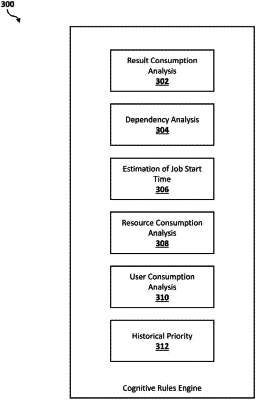| CPC G06N 5/025 (2013.01) [G06F 9/4881 (2013.01); G06F 9/5038 (2013.01); G06N 3/08 (2013.01); H04L 41/5022 (2013.01); G06F 2209/484 (2013.01); G06F 2209/5019 (2013.01); H04L 41/5019 (2013.01)] | 17 Claims |

|
1. A method for job prioritization, the method comprising:
receiving, by a cognitive rules engine, one or more jobs;
analyzing, using a learned metric of the cognitive rules engine, the one or more jobs, wherein the learned metric is based on a user inputted priority of the one or more jobs, a number of consumers of a result of the one or more jobs, a dependency of the one or more jobs, a number of computational resources required to run the one or more jobs, wherein the learned metric of the cognitive rules engine comprises:
using a result consumption analysis module to predict the number of consumers of the result of the one or more jobs;
using a dependency analysis module to determine the dependency of the one or more jobs on each other;
using an estimation of job start time module to determine a time required to finish a jobs in order to meet a service level agreement (SLA);
using a resource consumption analysis module to determine the number of computational resources required to run the one or more jobs;
using a user consumption analysis module to determine a consumer of the result of the one or more jobs; and
using a historical priority module to determine a historical priority of the one or more jobs or of a job with same characteristics; and
prioritizing the one or more jobs based on a result of the learned metric of the cognitive rules engine.
|